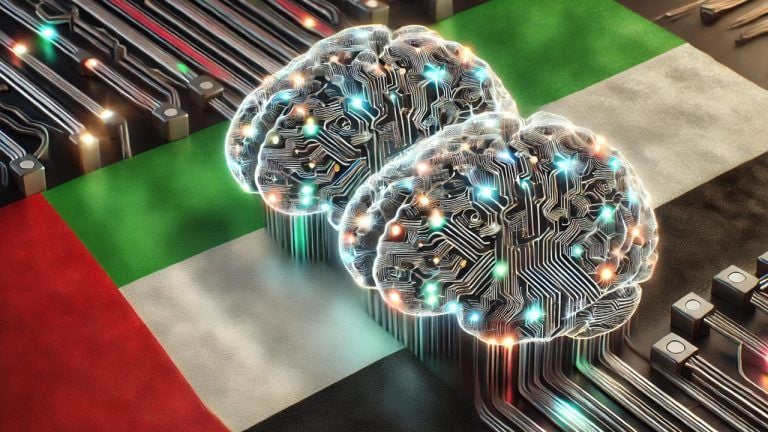 Bitwise, a crypto index fund and ETF provider, believes that ethereum has the fundamentals needed to recover from its bad price performance compared to currencies like bitcoin. Bitwise CIO Matt Hougan compared Ethereum with Microsoft, stating that while it was not as disruptive as other chains, it still had the size to overcome these difficulties. […]
Bitwise, a crypto index fund and ETF provider, believes that ethereum has the fundamentals needed to recover from its bad price performance compared to currencies like bitcoin. Bitwise CIO Matt Hougan compared Ethereum with Microsoft, stating that while it was not as disruptive as other chains, it still had the size to overcome these difficulties. […] Microsoft and G42, a United Arab Emirates-based AI firm, have established two new AI centers in Abu Dhabi. These centers aim to promote responsible AI in the Middle East and the Global South. They will identify best practices, support AI projects for societal goals, and strengthen the relationship between Microsoft and the UAE. G42’s partnership […]
Microsoft and G42, a United Arab Emirates-based AI firm, have established two new AI centers in Abu Dhabi. These centers aim to promote responsible AI in the Middle East and the Global South. They will identify best practices, support AI projects for societal goals, and strengthen the relationship between Microsoft and the UAE. G42’s partnership […]

The feature could be very useful, but privacy analysts have raised concerns over its reach.
Microsoft is trialing a new Windows feature called “Intelligent Media Search” that transcribes media files into text that can be processed by AI.
The feature would turn any spoken words in audio or video files on a Windows computer into text. This text output would be saved to a data file which could then be accessed by an AI model.
Users who allow the feature would be able to conduct text searches for any words appearing in their videos. A content creator, for example, with an expansive library of videos stored on their device could use the “Intelligent Media Search” feature to find a video featuring a specific line or to organize all files featuring a specific set of words or phrases.

The company expects next quarter to be even better with improvement projected across nearly every vertical.
Nvidia’s earnings call did not disappoint as CFO Colette Kress announced Q2 earnings of $30 billion, beating its previous estimate by two billion dollars. This bullish signal could buoy the burgeoning artificial intelligence sector as markets reopen on Thursday Aug. 29.
Nvidia held its Q2 earnings call on Wednesday Aug. 28 in what investors and analysts have been treating as a sort of “Groundhog’s Day” for the artificial intelligence industry.
CFO Colette Kress’ announcement that the company posted a second quarter revenue of $30 billion should be enough to allay any worries over an artificial intelligence winter. These figures beat estimates by about seven percent. This continued the firm’s streak of record-breaking quarters and prompted a litany of positive responses across social media.

The ten most valuable tech firms in the world are all involved in developing technology for the robotics industry.
The next big thing in the technology industry appears to be consumer robotics and there could be massive implications for both Main Street and Wall Street.
An analysis of the top ten tech firms in the world by market capitalization, their 2024 performance to-date, and what we’ve been able to glean about their current budgets indicates that big tech is ready to move beyond chatbots.
There are currently countless robots in the world. They’re used to build cars, stitch clothing, and even handle nuclear materials. But these specialized machines are purpose-built to perform specific tasks and typically not available or even useful to the average person.

History is littered with failed predictions about the future of technology. Have we learned anything along the way?
HODLing — an acronym that means "hold on for dear life" — is built on the long-term optimism that has been the driving force behind technological advancements that have forced us into modernity. It's time to take that embrace of crypto culture a step further. We should make HODLing the default American position on all technology.
Americans tend to be optimistic on general terms, but that quickly gives way to pessimism in the specific. Just a decade ago, 78% said they would not eat lab-grown meat. Today? The number has nearly flipped, with 60% now indicating a willingness to try it.
Another example of Americans being generally optimistic about technology, but pessimistic about long-term effects is the widespread belief that self-driving vehicles will become commercially available within their lifetime. One 2021 survey by the Pew Research Center found that 63% of Americans believe that fully self-driving cars will be common within the next 50 years, but they are hesitant about actually riding in one.

The law appears more corporate-friendly, but the implications for consumers are a bit murkier.
California lawmakers have amended a controversial bill that would hold artificial intelligence firms accountable for harms caused by their products in response to industry criticism. However, it’s unclear if the state’s concessions will be enough to convince naysayers in the tech industry.
The bill, called the Safe and Secure Innovation for Frontier Artificial Intelligence Models Act (SB-1074), essentially seeks to protect whistleblowers and empower the state of California to intervene if it has reason to believe an AI-related catastrophe is going to occur.
As Cointelegraph recently reported, the tech industry is in a bit of an uproar over the bill’s stipulations, with many tech luminaries saying it would stifle innovation and growth.

The researchers based their ideas on “proof of personhood” technologies developed by the blockchain community.
Artificial intelligence researchers are worried that AI bots are eventually going to take over the internet and spread like a digital invasive species. Rather than approach the problem by attempting to limit the proliferation of bots and AI-generated content, one team decided to go in the opposite direction.
In a recently published preprint paper, dozens of researchers advocate for a system by which humans would need to have their humanity verified in-person by another human in order to obtain “personhood credentials”
The big idea appears to be the creation of a system wherein someone could prove they were human without having to disclose their identity or any further information. If that sounds familiar to those of you in the crypto community, it’s because the research is based on “proof of personhood” blockchain technologies.

The metaverse is dead, long live the metaverse.
Microsoft is reportedly looking to take on Apple’s Vision Pro headset with new hardware it would develop in partnership with Samsung. This would mean that five of the ten most valuable companies by market capitalization — Apple, Google, Meta, Microsoft, and Nvidia — are currently developing new metaverse gear.
The Microsoft news comes from a local outlet in South Korea, The Elec. According to the report, Microsoft plans to order hundreds of thousands of OLED panels from Samsung for a device to be mass produced in 2026.
That’s a ways off and, according to The Verge, the device will be a headset meant for spatial computing (as opposed to virtual reality). The Verge also indicated that it was specifically not meant for the metaverse — but, any display device, including a computer monitor, can interface with “the metaverse,” spatial computing devices just offer a different level of immersion.

Breakthroughs in scalability, error-correction, and infrastructure have led to an accelerated timeline for quantum advantage.
Quantum computing is one of those “just around the corner” technologies that has the scientific community split. Tech outfits such as Google and IBM have gone full throttle with both R&D and marketing as if they’re already here while many independent researchers have claimed quantum computers will never work.
Most people working in the field, however, believe that quantum computers will be able to solve problems that classical computers can’t within the next 10 years.
This is according to a recent survey of 927 people with associations to the field of quantum computing (researchers, executives, press, enthusiasts, etc.) conducted by QuEra. Of those surveyed, 74.9% “expect quantum to be a superior alternative to classical computing for certain workloads” within the next 10 years.